Quentin Tarantino, self-proclaimed ‘student of Hong Kong cinema’, talks the making of The Hateful Eight
The visionary director’s latest is an intense thriller filled with despicable characters
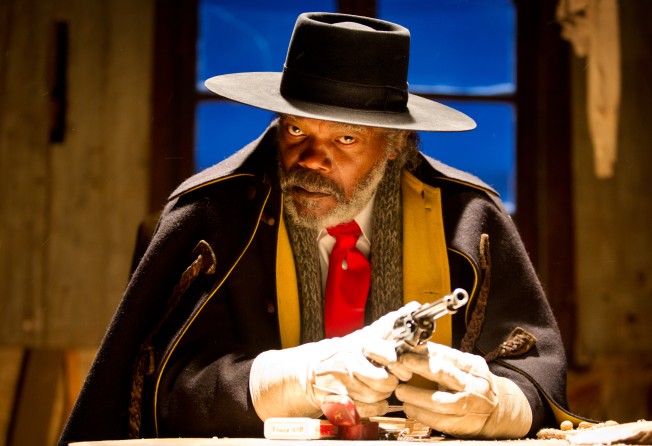
Quentin Tarantino loves to talk films. The ones he’s made, those that other people have made, something he saw long ago, it doesn’t matter. Line up a dozen media interviews for him in one day, but as long as he gets to focus on film, he can keep going and not tire.
That was clearly evident on a recent Sunday afternoon when Tarantino, relaxed in his suite in a Beverly Hills hotel although nattily dressed in a pale suit, got to talk about apparently one of his favourite film-related subjects – Hong Kong cinema.
“I think I could call myself not just a fan of Hong Kong cinema,” he says. “But I’m a student of it. A scholar. As I’ve done more study on it, I know even more than I did when I was younger. I didn’t know about the women’s movies from the sixties and seventies. They weren’t shown to us here in America. Now, I know them. It became about more than the Shaw Brothers and Golden Harvest.”
Tarantino has long maintained that his enduring love of Hong Kong action films has informed his aesthetic. His first two films, the dark and gritty Reservoir Dogs (1992) and the iconic Pulp Fiction (1994) earned him a reputation as a visionary in the cinematic arts. Then followed Jackie Brown, Kill Bill, Inglourious Basterds and more. Awards and accolades started to accumulate, as much for himself as the talent he has put in his films – Samuel L. Jackson, Christoph Waltz, Uma Thurman. He became known for a unique kind of film – violence and bloodshed mixed with snappy dialogue and subtle, sometimes inexplicable, humour. During an early screening of his latest, The Hateful Eight, the audience burst into laughter every time something gruesome happened on screen.
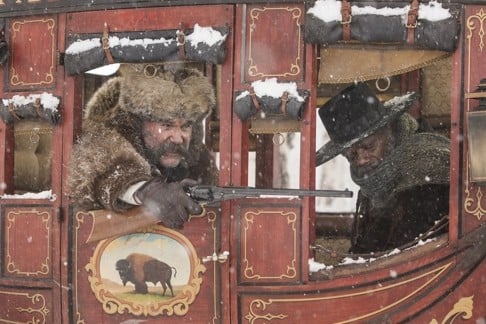
That starts you off, and it becomes something you could never have imagined before you started writing.”
The film, which clocks in at just under two hours and fifty minutes, is a work of historical fiction set some years after the Civil War in Wyoming. It was filmed in the dead of winter in Colorado, meaning Tarantino and his crew had to contend with brutal, unpredictable weather.
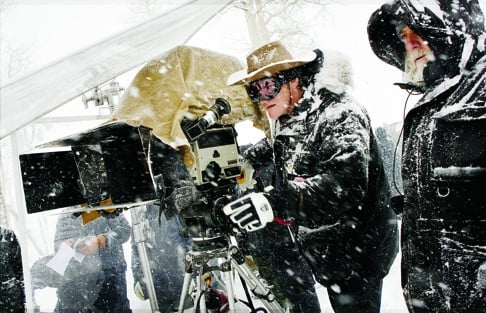
The film tells the story of a pretty odious group of strangers, whose lives (and naturally, this being a Tarantino movie, deaths) intersect. The cast includes Tarantino regulars Jackson, Tim Roth, Michael Madsen and Kurt Russell. Jennifer Jason Leigh is the main female character, and this marks her first time working with Tarantino.
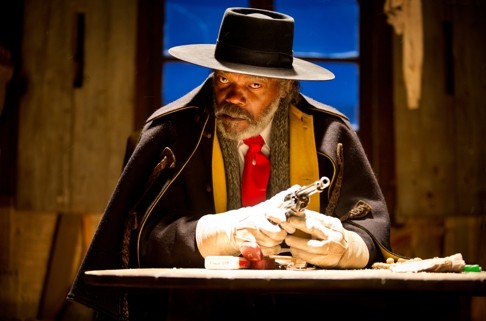
This nefarious group includes bounty hunter John Ruth (Russell), his captive Daisy Domergue (Leigh), Major Marquis Warren (another bounty hunter, played by Jackson) and other suspicious characters such as a confederate general (Dern) and a hangman (Roth). They’re all trapped inside a restaurant during a snowstorm, and as the story moves forward and paranoia fills the room, insults are hurled, shots are fired, and bodies are dismembered.
“While they’re all hateful, some are more likeable than others, or at least more enjoyable to watch,” Tarantino says. “As a viewer, you can’t help but find a character to like, or to root for. What’s fun in a scenario like this is that it’s your choice whoever you decide to like. That means you’re rooting for them despite certain things. Maybe that changes over the course of the story, and maybe it doesn’t.”
The story is staged almost like a theatrical play, broken into chapters. Tarantino is the master of framing a shot in a certain way: here, his camera lingers on the blindingly white and desolate snowscape, creating a taut, unnerving mood. That’s reflected in the music as well – a tense piece that was composed by Ennio Morricone, who in January won a Golden Globe for his score, and has been nominated for an Oscar. It also marks the first time that Tarantino commissioned a complete original score; the music, like the setting, plays almost like another character in the film.
Fans of Tarantino films know character is key in his work, and the director is meticulous about who he casts. He has developed a connection with actors he frequently works with, such as Jackson and Roth.
“They’re really good actors, and you can write for their strengths. If they have their own iconic baggage, you can double down on that and explore it. Or you can go against that if you want. However, if you write a character and are not writing it for a particular actor, then that character can flourish in its own way, and there’s no limitation.”
Leigh disappears into her character, the prisoner Daisy Domergue – so much so that she’s garnered her first Oscar nomination (for best supporting actress) for the part. Her character is a foul-mouthed and obnoxious woman, resilient to the abuse from the men around her.
“She became one of my favourite characters,” Tarantino says, “because I didn’t know who she was, and she had to reveal herself to me as the piece went on.”
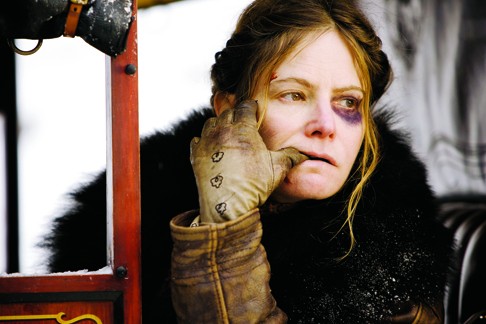
“There’s no way for any actress to come in and take any chosen scene from the script and then just deliver it in the office and say, ‘that’s it.’ You have to take a leap of faith and cast a terrific actress to play the role, and then she has to build on that role every day. She was very impressive when she came in for the audition, and sparked my interest enough that I had something of a Jennifer Jason Leigh film fest – I watched and rewatched her other films. I loved her as a performer in the nineties. She was the female Sean Penn. That’s what I needed. If I have seven strong male actors, I need a female Sean Penn in that group – and that’s what I got with her.”
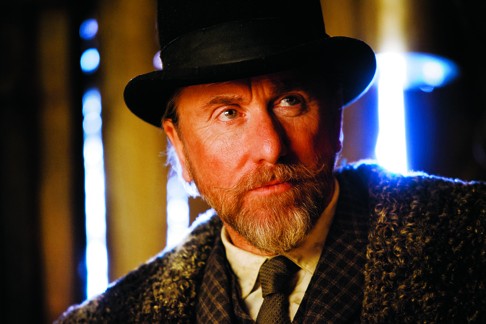
“Part of the trick of writing it was to not know anything about anybody – especially not in the first draft,” he says. “Normally I know a whole lot about the characters. In this instance, I didn’t want to know any more than the audience did. I wanted them to reveal themselves to me, and to be an enigma at first. I’ve never written that way before.”
In all his films, this latest one included, there are notions of honour – and Tarantino says this is something he “soaked in by osmosis” watching Cantonese films.
“I grew up understanding that philosophy of honour that wasn’t always emphasised in American movies,” he says. “I watched that stuff growing up. I loved kung fu movies, but at a certain point I’d seen enough of them, and then to a certain degree, accidentally, I came across the eighties action movies out of Hong Kong.”
That discovery, he says, seemed to dovetail with the time that American cinema was “at its most uncreative, its most repressed. The endings of American films in the eighties were so bad, that you couldn’t even hold it against them, because if you did, you wouldn’t like anything”.
So Tarantino spent time in the Chinatowns of various cities, going into stores to look for video cassettes of Hong Kong films.
“There, amidst all the ginseng root and spices, there’d be a little video section. I’d be the only white guy in the place. And I became voracious about it. I don’t think I realised how many rules American cinema had until I saw Hong Kong cinema break them.”
The Hateful Eight opens on February 18